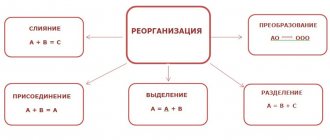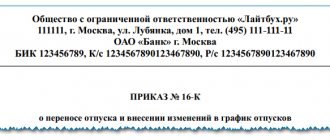Reasons for dismissal
At the end of the maternity period, workers are equal in rights and responsibilities with other employees of the company.
It becomes possible for them to terminate the contract for all the reasons contained in Article 77 of Chapter 13 of the Labor Code of the Russian Federation. A young mother is often forced to leave on her own initiative by family circumstances. Social responsibility to the family, a sick “out-of-kindergarten” child, or loss of professional level after a long period of inactivity pushes the decision to leave your employer at the end of the maternity period.
In order to end your employment relationship with your employer, it is enough to fill out and submit a corresponding application to the personnel management service 14 days before the expected date of departure.
For your information
The document is drawn up in two copies, one of which remains in the hands of the applicant as confirmation of the fact of filing the application.
A personal copy of the person is marked with a date and signature from a personnel employee confirming receipt of the document. The application is considered submitted if it is sent by registered mail with notification by mail.
If the employee intends to continue her work activity after maternity leave, the employer puts moral pressure on her in order to force her to write a statement under Art. 80 of the Labor Code (own desire), you should immediately contact the labor inspectorate with a statement of violation of your rights.
When the intentions of the person returning from maternity leave and the employer to terminate cooperation coincide, then, guided by Art. 78 of the Labor Code, you can formalize the termination of an employment contract without working out. To do this, the resignation letter should indicate information about the existence of interest in this action on both sides.
Dismissing an employee unilaterally is a very time-consuming task. To legally terminate a contract with a person, including someone who has recently returned from maternity leave, compelling reasons are required, such as:
- gross violations: absenteeism, reporting to work under the influence of toxic substances (alcohol, drugs, etc.), theft of company property, disclosure of classified information;
- recording the fact of immoral behavior if the employee works as a teacher;
- identifying falsifications in the documents submitted by the employee when drawing up an employment contract;
- insufficient qualifications of the employee, recorded by the commission during certification.
A full list of grounds is contained in Article 81 of the Labor Code.
For your information
A young mother, even if she is a responsible employee, has the right to be checked for qualifications.
In case of unsatisfactory results of the certification, the employer is obliged to offer his employee another suitable, even less paid position. And only after the employee’s written refusal of all other vacancies, his contract is subject to termination at the will of the head of the company.
Staff reduction
The legislator guarantees women the safety of their place of work until the end of the maternity leave period; the norm is present in Article 256 of the Labor Code. A layoff cannot affect a young mother until she returns to work. But, if the employee herself does not object to being laid off or transferred to another position, then it is enough for her to sign her consent.
Important
The employer does not have the right to force a person to agree to lay off a person on maternity leave.
After completing the period of leave to care for a newborn up to 3 years, the woman ceases to enjoy immunity during the planned reduction of personnel. Reducing the number of staff while simultaneously releasing working people from their positions is a large-scale procedure with a lot of paperwork, which must have a good reason. The process is regulated by Article 180 of the Labor Code.
When reducing the number, the manager, based on the norms of Article 178 of the Labor Code, must:
- offer persons subject to layoffs other vacant positions;
- notify about the planned reduction 60 days in advance;
- pay wages within 2 (sometimes 3) months after the layoff, and also issue severance pay (full salary).
| Norm of the Labor Code of the Russian Federation | Category of persons. |
| Art. 261 (prohibition on reduction) |
|
| Art. 179 (who will have priority when a choice arises) |
|
All things being equal, the manager is obliged to retain on his staff employees who have a higher level of professionalism and significant indicators of labor productivity.
For your information
If the company has a valid collective agreement, then its provisions may contain additional categories of employees who will remain on staff with other identical characteristics.
Important
A complete stop of the company's activities or the closure of an individual entrepreneur threatens forced dismissal of absolutely all employees on the payroll.
Labor contracts will be terminated according to paragraph 1 of Art. 81 of the Labor Code, even if the person is on sick leave or maternity leave.
The employer's responsibilities are the same as during layoffs, i.e. he is obliged to notify all persons on time (2 months in advance) about the upcoming closure of the company, pay severance benefits, and also ensure the maintenance of former employees while they are looking for a new job (2 - 3 months).
Important
You should not agree to the closing employer’s proposals to formalize dismissal under another article, including by agreement of the parties or at the personal request of the employee. This will result in the loss of the right to all payments accompanying dismissal during liquidation.
We invite you to read: Can Bailiffs Write Off a Husband's Loan Debt from a Wife - Advice from a Lawyer
At the end of maternity leave, the employee’s rights are equal to the rights of an ordinary employee and she may lose her job in the following cases:
- At her own request (Labor Code of the Russian Federation, Art. 80) - a woman can resign upon leaving maternity leave at any time by writing a corresponding application addressed to the employer. The employee must notify the employer of her intention 14 days before the date of dismissal.
- At the initiative of the employer, an employee may be fired after maternity leave for the following reasons:
- The employment contract has expired (Labor Code of the Russian Federation, Article 79) - the employer notifies the employee in writing three days before the date of dismissal.
The professional qualities of the employee do not correspond to the position held based on the results of certification (Labor Code of the Russian Federation, Article 81) - the employer must offer vacant positions that correspond to the woman’s qualification level; in the absence of her consent to the proposed job, a dismissal order is issued.
- Failure by an employee to fulfill her job duties without a valid reason (Labor Code of the Russian Federation, Article 81) - the employee has more than two “unremoved” disciplinary sanctions during the year.
- Theft of property, intentional damage or destruction, embezzlement (Labor Code of the Russian Federation, Article 81) - the enterprise organizes a commission of at least three people to register the fact of violations, and then issues an order to dismiss the employee.
- For layoffs (Labor Code of the Russian Federation, Article 81) - the employer issues an order and notifies the employee in writing of the upcoming dismissal at least two months in advance.

Upon liquidation of an organization (Labor Code of the Russian Federation, Article 81) - two months before the date of liquidation of the enterprise, the employer notifies the employee in writing of the upcoming dismissal.- In case of violations of discipline (Labor Code of the Russian Federation, Art. 81) - if a worker appears at the workplace drunk, violates labor safety rules, discloses commercial, official or state secrets, then the enterprise creates a commission of three or more people, which registers the fact of violation, Then the woman is given a disciplinary sanction in the form of dismissal.
An employer does not have the right to independently take tests from an employee to confirm the presence of alcohol or drug intoxication. - In case of absenteeism (Labor Code of the Russian Federation, Article 81, paragraph 6) - the employee writes an explanatory note to the employer about the reason for her absence from the workplace, then the employer issues an order to impose a disciplinary sanction on the employee in the form of dismissal.
Important! The employer must provide evidence of crimes committed by the employee.
Options for dismissal after maternity leave
Ignorance of the laws of the Russian Federation and their own rights makes young mothers worry about whether they can be fired after returning from maternity leave.
Termination of employment relations with a young mother who has returned from maternity leave without her desire is possible only for a good reason - upon liquidation of the company, reduction of staff and termination of a fixed-term contract. Quite common is the practice of psychological pressure from management, when a woman is threatened with certification of professional suitability, suggesting that she has lost her qualifications during maternity leave. In this case, the employee must remember that the results of such certification cannot be the only basis for her dismissal, and if the employer forces her to resign, citing unsatisfactory assessment results, the woman can appeal to the trade union, labor inspectorate and other authorities (including the court) to protect your rights.
A dismissal order that does not have a serious basis, as well as psychological pressure from the employer or the personnel department in order to push a woman to leave work, fraud with documents (for example, forging a resignation letter and falsifying an employee’s signature) are punishable by the court, which will reinstate the woman to previous place of work. In addition, if the employer upon dismissal did not provide the employee with all the necessary documents (work book, certificates, etc.), he faces a fine of up to half a million rubles.
At the same time, the employer has legal grounds to dismiss a woman on maternity leave after leaving maternity leave if she has committed a serious violation of work discipline or a crime (for example, she has been caught in theft) - in such cases, the law will be on the side of the employer. In this case, the employer is obliged to carry out and formalize all required procedures in accordance with the procedure established by law.
At the initiative of the employee
The employee has the legal right to dismissal after maternity leave at her own request.
To do this, all you need is a free-form application addressed to the employer - you can register it yourself with the secretary or send it by mail with acknowledgment of receipt. An employee must notify her of her intention to resign at least two weeks in advance. If she does not want to work 14 days, then her resignation letter should be written before the end of the maternity leave. It must indicate the filing date and expiration date of the employment contract.
At the mutual request of the parties
At the end of maternity leave, a woman can be dismissed by agreement of the parties - according to Article 78 of the Labor Code of the Russian Federation, but only with the mutual desire of the employee and the employer (for example, the company wants to give the place to another employee, and the woman does not want to go to her workplace). This option allows you to do without working out. The employee's application must include a request for the employer's consent to terminate the contract. The procedure and amount of payments are absolutely the same as for dismissal on one’s own initiative.
Reduction of company staff
In case of staff reduction, the dismissal of a former maternity leave takes place in the same manner as the dismissal of other employees - on the grounds provided for in the Labor Code and with the same payments and compensation, as well as with two months' written notice of the reduction.
However, it is impossible to lay off a woman who:
- has a child under 3 years of age;
- is a single mother of a child under 14 years of age;
- cares for a disabled child under 18 years of age;
- provides for three or more young children in the presence of a spouse who remains unemployed;
- has ever been injured at this enterprise;
- is a war invalid;
- sent by the employer for advanced training (with her consent).
Dismissal upon liquidation of an enterprise
The procedure for dismissing a woman after maternity leave in this case is carried out on a general basis.
Unfortunately, when a company is liquidated, all employment contracts are terminated, including mothers on maternity leave and parental leave. Upon dismissal, all payments to the employee must be made before the expiration date of the employment contract. The mother is paid maternity benefits and a lump sum (at the birth of the baby). But to receive care benefits, you need to contact the social insurance fund (the local body with which the employer was registered).
How to resign of your own free will correctly
Exit from maternity leave, as well as dismissal after this period, is very common. The main reason for this is family circumstances. According to the law, dismissal after maternity leave can be formalized both after its end and during the period of maternity leave.

Maternity leave work before dismissal
But quite often it happens that the employer himself leads the woman to dismissal, explaining this by a long absence from work, and, consequently, loss of skills. It is also possible that the new employee satisfies his superiors more. In this case, the boss can force you to resign at your own request. Therefore, many women are concerned about the question of whether a woman can be fired after returning from maternity leave.
Important! It must be remembered that if there is a desire to quit after maternity leave, the employer may require a two-week period of work to find a replacement for the employee.
Some employers claim that a small child will interfere with the normal performance of work duties, and also force the woman to leave her workplace.

But one’s own desire is one’s own because no one can influence it.
When deciding on dismissal at the initiative of the employer, an employee after maternity leave enjoys some privileges in the following cases:
- The employee is a single mother (Labor Code of the Russian Federation Art. 261) - a woman cannot be dismissed at the initiative of the employer, except in cases of liquidation of the enterprise, as well as gross violations of labor duties by the employee: absenteeism, appearing at the workplace while drunk, embezzlement, theft and etc.
- An employee is dependent on two or more dependents (Labor Code of the Russian Federation, Article 179) - when reducing the number of staff, under equal conditions, the employer must give preference to an employee who has two or more dependents in full care.
During the period when the employee is on maternity leave, it will not be possible to fire her. This is recorded in Article 261 of the Labor Code of the Russian Federation. It says that during pregnancy or maternity leave and until its end, the employer does not have the right to fire a woman, with the exception of liquidation of the enterprise or termination of the activities of the individual entrepreneur.
Such grounds do not allow an employer to dismiss an employee unilaterally.
However, there are opportunities to discuss the current situation and come to an agreement between the parties or other options for solving the problem.
Expert opinion
Irina Vasilyeva
Civil law expert
After returning from maternity leave, the opportunity to fire the employee appears.
Like any ordinary employee, a woman who has returned from maternity leave has the right to leave work on a general basis. To do this, you must submit a letter of resignation and work for fourteen days, as regulated by the Labor Code. You can act more cunningly and not work it out.
To do this, you need to write an application two weeks before your maternity leave ends. Then the employee will be fired immediately after leaving it.
From the point of view of the law, management does not have the right to refuse a woman’s desire to resign after maternity leave. But in practice, there are cases when an employer does not want to let an employee go for one reason or another. It is important to know that he has no reason for this.
For more details on whether it is possible to fire a female employee after caring for a child under 3 years old and how to do this, read our material.
We invite you to read: Vacation without pay
The maximum period for which a boss can legally retain an employee is fourteen days from the date of filing an application for voluntary resignation. Article 80 of the Labor Code of the Russian Federation clearly states that the manager must dismiss the employee who submitted such an application.
Returning to work at the end of maternity leave
After the child turns 3 years old, the woman is obliged to return to her workplace, since she is not entitled to further leave.
After she goes to her workplace, she becomes an ordinary employee. But at the same time, she may have the right to preferential retention in the workplace in the event of a reduction in staffing levels.
In other cases, an employee may be dismissed at the initiative of the employer on a general basis, subject to the required sequence of actions.
Note! There is one caveat - after a woman’s maternity leave ends, she cannot be subject to certification for another 12 months, and accordingly, during this period she cannot be fired due to inadequacy for the position held.
How to do this correctly?
Writing an application
The application can be written either by hand or printed. The header indicates the following:
- To whom: it is necessary to write the position of the manager and the name of the organization in which he is in charge, as well as his full last name, first name, patronymic.
- From whom: similar to the first point, you need to indicate your position and full name.
The word “Statement” will serve as the title. Then the following wording is written: “I ask you to fire me of your own free will.” Below are the date and signature. It is not at all necessary to write the reason why you need to leave your job.
Attention! If a document is drawn up electronically, it is important not to forget that it still needs to be signed by hand, otherwise it is invalid.
You can also calculate when two weeks have elapsed and write a clarifying sentence: “I request your dismissal to take place on __.__.20__.” It is not recommended to use the preposition “s”, since the HR department may fire you a day earlier. Therefore, it is worth setting a specific date.
The document can be delivered to the addressee in the following ways:
- give in person;
- send by registered mail with notification.
The two-week countdown begins on the next day relative to when the boss received the application.
A sample letter of resignation after maternity leave is attached.
Drawing up an order
It is imperative that with any dismissal, the personnel officer must draw up a dismissal order. In most cases, a T-8 form is filled out for this. Such a document must indicate:
- Name of company.
- FULL NAME. and the position of the dismissed employee.
- Grounds for dismissal.
- Date of termination of the employment contract.
- Signatures of the parties.
The entry in the work book depends on the reason for dismissal. It is very important to pay attention to this moment and not take the book without looking.
When leaving work of your own free will, the following entries are legal in the book:
- “dismissed at his own request, paragraph 3 of Article 77 of the Labor Code of the Russian Federation”;
- “dismissed at the initiative of the employee, paragraph 3 of Article 77 of the Labor Code of the Russian Federation.”
The photo below shows a sample entry in the work book about voluntary dismissal after maternity leave.
Few people know that upon dismissal, an employee must be given not only work and medical records (if conditions require it).
When submitting an application for voluntary leave, the employer may, at the employee’s request, issue copies of the following documents:
- The order of acceptance to work;
- order for promotion/change/transfer (if any);
- employment contract;
- additional agreements (if any).
This is regulated by Article 84.1 of the Labor Code of the Russian Federation. The package of documents described above must be issued within three days from the submission of the application for dismissal. The above list can be obtained from the HR department.
In addition to personnel documents, an employee can also take accounting documents.
- Help 2-NDFL. It contains information about all payments from which tax and insurance premiums were withheld. It may be useful at your next job if you apply for a tax deduction.
- Certificate form 4H. Displays income information for the last two years. It will be useful in a new workplace in case of going on sick leave. Which, unfortunately, is not impossible for a woman who has just returned from maternity leave. Since at an early age children often get sick. Therefore, it is important to take care of obtaining this certificate. Otherwise, the payments on the ballot will be less.
- Certificate of income for the last three months. Needed for registration at the labor exchange. Based on the information contained in it, unemployment benefits will be calculated.
Attention! All documents must be certified by the organization’s seal and the “true copy” stamp.
A woman must receive documents and payment no later than on the day of dismissal (Article 140 of the Criminal Code of the Russian Federation). They can be collected not only by the employee herself, but also by another person with a notarized power of attorney from her.
Options for termination of employment
Dismissal is illegal if the norms of the labor code are not met or there are no sufficient grounds for the procedure. For example, an employee is fired of her own free will, but the woman did not write a letter of resignation to the employer. The employer has the right to reprimand or dismiss the employee for a disciplinary violation. But if the court finds that a reprimand is sufficient for the employee’s misconduct, the dismissal will be declared illegal.
Illegal dismissal of an employee entails punishment by the employer in the form of a fine of up to 50,000 rubles (Administrative Offenses Code of the Russian Federation, Article 5.27, paragraph 1). If an employer commits a similar administrative offense repeatedly within a year, then the law provides for punishment in the form of a fine of up to 70,000 rubles or disqualification for up to three years (Administrative Code of the Russian Federation, Article 5.27, paragraph 2).
Dismissal after parental leave for up to 3 years can be carried out for several reasons. The procedure for dismissal, the rules for its implementation and the consequences for both parties depend on this.
Termination of employment at the request of only one party - the employer, immediately after leaving maternity leave - is difficult to implement in practice.
Typically, dismissal without the employee’s consent is applied for a gross violation of labor obligations, for example:
- repeatedly going to work while intoxicated;
- theft of property proven in court;
- inconsistency with the position held, etc.
In order for the appropriate grounds to arise, time must pass and various violations must be committed.
This can happen, but in practice such situations are rare. In addition, if a woman who has returned from maternity leave has a child under 3 years of age or other relevant grounds, she cannot be fired.
We invite you to read: Personal income tax on winnings in lotteries
Do I need a letter of resignation from a woman on maternity leave if we are dismissing her by agreement of the parties?
- Voluntary - carried out by decision of the owner. Feature: before an official decision is made to terminate activities, it is possible to transfer an employee to another company. A prerequisite is written consent.
- Forced - the decision is made by higher-level companies or founders. It differs in that dismissal implies future employment (the responsibility is taken by the employment service).
- dismissal on his initiative (exception - liquidation of the company);
- involvement in overtime, rotational and night work;
- call from leave (maternity or child care);
- sending an employee on a business trip;
- replacing vacation with cash.
We recommend reading: Payment of state duty by a legal entity for an individual
Arbitration

The intervention of third parties in the relationship between the employer and the employee is required when it was not possible to resolve the issue without conflict. Some managers ignore the law in an effort to get rid of an inconvenient employee, this especially often happens to women after returning from maternity leave. The following are common conflict situations:
- Compulsion to dismiss according to the provisions of Art. 80 TK (at your own free will). If the employer attempts to obtain an application under this article, you should contact the labor inspectorate in writing. The matter may be limited to a conversation between the manager and the inspector.
- The termination of the contract was actually carried out at the will of the employer, but other provisions of the law are indicated in the work book. The labor inspector should be notified of this fact. By going to court, you can get the dismissal record annulled.
- They do not issue a work permit after dismissal. This is a gross violation of the rights of the resigning person; courts can impose a fine on the head of the company of up to 500 thousand rubles.
Important
Most of the court decisions are made in favor of the applicants, especially when it comes to pregnant women or those already having children.
Do they have the right to fire while on maternity leave?
- work book;
- dismissal order;
- salary certificate for the last two years;
- certificate 2-NDFL for the last three years;
- a copy of the application for parental leave;
- application for recalculation of benefits;
- application for recalculation of benefits, if any;
- document confirming parental leave;
- a copy of the sick leave certificate.
In addition to the employment contract or in the document itself, it may be stipulated that when leaving at your own request, there is no need to wait until two weeks have passed from the date of notification to the employer.
How to write an application correctly: writing sample
If you need to stop working at your own request, you should draw up a statement. If there are mistakes in it, it can create problems for both the employee and the employer. It is better to study the sample design in advance, as this will facilitate the process of its preparation, save time and eliminate all kinds of risks.
The application must indicate the following information:
- the name of the manager to whom the application is addressed;
- date of compilation;
- reason for dismissal;
- desired date of dismissal.
The application is endorsed by the employee and submitted to the manager for approval of the document and determination of the last day of work.
When does maternity leave end?
The concept of “maternity leave” does not exist in the Labor Code of the Russian Federation. In common parlance, this definition means the period from maternity leave until the child reaches three years of age. The last date is the end date of maternity leave. Even if a woman interrupted it and went back to full-time work, she can return to maternity leave until the child turns three years old.
The employer will be able to dismiss her on his own initiative during this period only in the event of liquidation of the enterprise or in the event of a gross violation of labor duties and discipline by the employee.
Do I need a letter of resignation from a woman on maternity leave if we are dismissing her by agreement of the parties?
Type of leave (annual, educational, without pay, etc.) Period of work Number of calendar days of leave Date Basis from to beginning of end 1 2 3 4 5 6 7 Maternity leave 140 09.09.2021 26.01.2021 Order dated 09/07/2021 N 15-r Child care leave 1003 166 01/27/2021 10/25/2021
07/11/2021 Order dated 01/25/2021 N 5-ozh Order dated 07/12/2021 N 25
Limited Liability Company “————-” represented by Deputy Director Mikhail Ivanovich Avdeev, acting on the basis of Power of Attorney No. 1/10 dated 07/01/2021, hereinafter referred to as the “Employer” on the one hand, and UAH ) Tatyana Aleksandrovna Gorbacheva, passport series……. No.……. , issued on 09/11/2021 by the Chertanovo Central Department of Internal Affairs of Moscow, hereinafter referred to as the “Employee”, on the other hand, in connection with the application received from the “Employee” to establish part-time work from 03/01/2021, we concluded this agreement to amend the contract for the performance of labor duties: 1. Amend clause 6.1 as follows. contract for the performance of labor duties No. 378 dated 07/01/2021: “The employee is assigned a five-day working week, with a working time of 4 hours 15 minutes. in a day". 2. Clause 5.1. Contract for the performance of labor duties No. 378 dated 07/01/2021 should be read as follows: “The Employee is paid for the actual time worked based on the established official salary in the amount of 13,000 (thirteen thousand) rubles, according to the staffing table.” 3. The terms of the contract for the performance of labor duties not affected by this agreement remain unchanged. 4. This agreement is drawn up in 2 copies, one for each of the parties, having equal legal force. 5. This agreement is an integral part of the Contract for the performance of labor duties No. 378 dated 07/01/2021.
We recommend reading: How to choose a certificate for public services if it has been downloaded from the Pension Fund
Is it possible to leave work without working?
An employee has a real opportunity to resign during or immediately after maternity leave, without working off or delay. In this case, the law provides for the absence of a mandatory two-week work period, but provided that the maternity leaver warns her employer of her intention during this period.

If you draw up an application in advance, while still on maternity leave, and submit it to the employer, then this period will expire before the employee has to go to work. In addition, if the employer agrees to dismissal in a shorter period of time, then it can be processed without a 2-week wait.
Calculation of compensation and other payments
The amount of compensation depends directly on the reason for dismissal, the number of unused vacation days and other parameters.
If there are vacation days that the maternity leaver did not spend before leaving, then compensation for them will be calculated in the standard manner.
If dismissal is carried out by agreement of the parties, then other types of compensation are possible, provided for by agreement between the participants. Their size and order of provision may vary.
Upon dismissal, a woman is entitled to pay. If you had to work the required two weeks, then a salary should be accrued for them in accordance with the salary and rate. The employer is also obliged to pay compensation for unused vacation (read about what payments are due if an employee quits after maternity leave, and from this article you will learn whether money is due for unused vacation periods upon termination of an employment contract).
The amount of payment is determined in the same way as in the general procedure, but the basis for calculation will be the period before going on sick leave for pregnancy and childbirth. In addition, the employee must be accrued severance pay and other supporting payments prescribed in the labor and collective agreements.
Dismissal of a maternity leaver by agreement of the parties
Leaving at your own request This is one of the most common ways of terminating an employment contract and leaving the workplace. As a rule, the reason for leaving is a change from a temporary job on maternity leave to a permanent full-time position. Dismissal of one's own free will during maternity leave occurs in the same manner as regular dismissal - an application for release from position is submitted to the head of the company 2 weeks before the expected departure. You need to pay attention to the following points: the application must be registered in the office of the enterprise; the two-week period of service begins the next day after the management of the company receives the employee’s resignation letter; on the last day of work at the company, the employee is required to issue a work book and other documents requested by him (2-NDFL certificates, copies of orders and other data), as well as pay the money due, including compensation for unused vacations; the employee must return all inventory items that were assigned to him during his work. We looked at the first case - leaving during maternity leave, but then the question arises, how to quit after maternity leave? To do this, the employee must submit an application 2 weeks before the end of the maternity leave and indicate the last day of maternity leave as the last day of work.
An exception is cases of liquidation of an organization or situations in which an entrepreneur ceases his own activities. Under such circumstances, it is simply impossible to maintain the employment relationship, so the contract is terminated. On what grounds is dismissal possible? The prohibition on terminating an employment contract while an employee is on maternity leave does not indicate the complete impossibility of dismissing such an employee.
We recommend reading: How to write a resume for a military nurse






